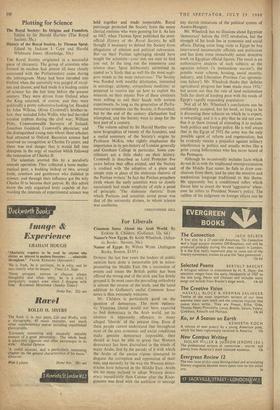Plotting for Science
History of the Royal Society, by Thomas Sprat. Edited by Jackson 1. Cope and Harold Whitmore Jones. (Routledge, 50s.) THE Royal Society originated in a successful piece of chicanery. The group of scientists who formed its nucleus had almost all been closely associated with the Parliamentary cause during the interregnum. Many had been intruded into Oxford when the university was purged of royal- ists and drones, and had made it a leading centre of science for the last time before the present century. They were driven from Oxford when the King returned, of course; and they were politically a pretty subversive-looking lot. Headed by John Wilkins, Oliver Cromwell's brother-in- law, they included John Wallis, who had decoded royalist cyphers during the civil war; William .Petty, Commonwealth Surveyor of Ireland; Jonathan Goddard, Cromwell's physician; and the distinguished young men whom these scholars had attracted to Oxford. Baconian science had received no recognition at Charles I's court; and there was real danger that it would fall into disrepute in the orgy of reaction which followed the restoration of Charles II.
The scientists averted this by a peculiarly smooth operation. They collected a tame mathe- matical peer, a budding bishop or two, several lords, courtiers and gentlemen who dabbled in science; and through their influence got the wily Charles II to become their patron. By this adroit move the only organised body capable of for- warding the interests of experimental science was
held together and made respectable. Royal patronage protected the Society from the many clerical enemies who were gunning for it. As late as 1667, when Thomas Sprat published the semi- official History of the Royal Society, he still thought it necessary to defend the Society from allegations of atheism and political• subversion. But—as their Puritan upbringing should have taught the scientists—your sins are sure to find you out. In the long run the manoeuvre cost science dear. Sprat deliberately advertised its appeal as 'a Study that as well fits the most negli- gent minds as the most industrious.' The Society was flooded with wealthy dilettantes, interested in astrology, alchemy, sympathetic medicine; or prepared to receive tips on how to exploit the minerals on their estates. Few of these amateurs were willing to soil their hands with serious experiments. So long as the generation of Parlia- mentarian scientists ran the Society, it flourished; but by the end of the century dilettantism had triumphed, and the Society went to sleep for the best part of a century.
The volume edited by Sir Harold Hartley con- tains biographies of twenty of the founders, and a useful summary of the Society's origins by Professor McKie, who rightly emphasises the importance in its pre-history of London generally
and College in particular. Some con- tributors are a little shaky on their history. Cromwell is described as Lord Protector five years before that office existed, and the Society is credited with 'the adoption of a plain and simple style in place of the elaborate rhetoric of the. Puritan writers.' In fact the Puritan preachers (with whom the early scientists were so closely associated) had made simplicity of style a point of principle. 'The elaborate rhetoric' from which Puritans and scientists saved prose was that of the university divines, to whom science was anathema.
CHRISTOPHER HILL


































 Previous page
Previous page